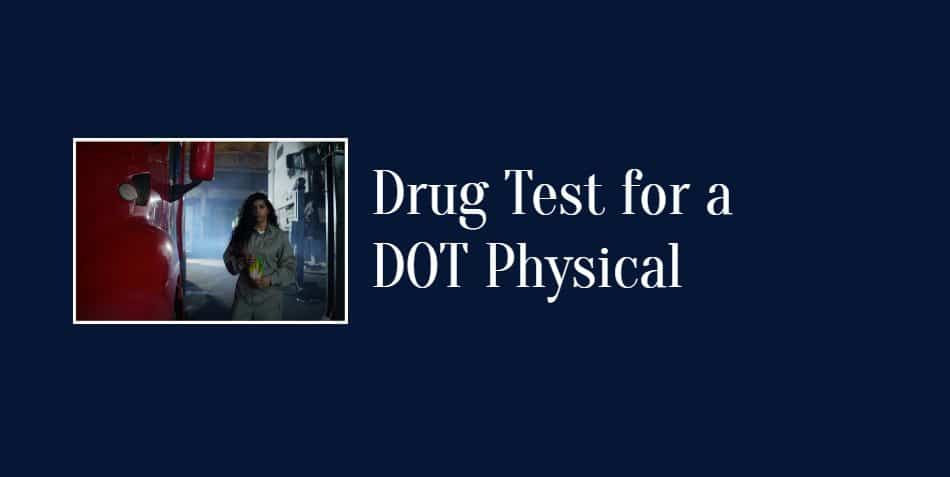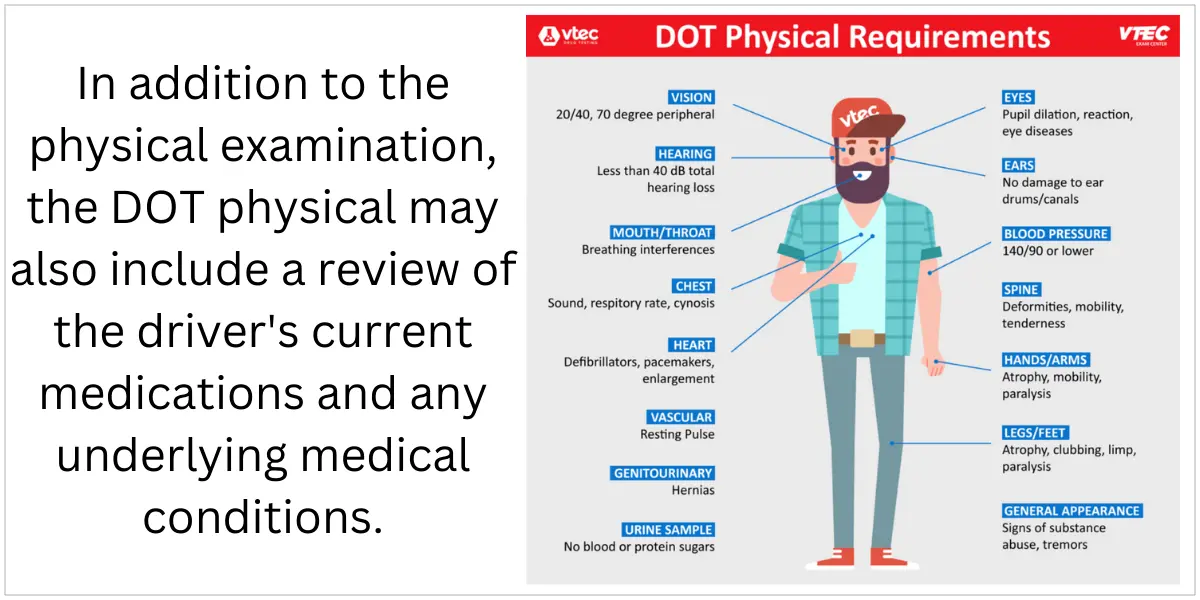Drug Test for a DOT physical?
If you’re planning to pursue a career in the transportation industry, specifically as a commercial driver, you may have heard about the Department of Transportation‘s (DOT) physical. The safety of drivers and the public depends on this requirement. The inclusion of drug testing in the DOT physical is a frequently asked question. In this article, we’ll explore the policies and procedures surrounding drug testing during DOT physicals.
Ensuring safety on the roads is a top priority, which is why the DOT has strict guidelines in place for commercial drivers. These guidelines include drug and alcohol testing to identify any potential impairments that could compromise driver safety. However, it’s important to understand the specific requirements and variations within different DOT agencies and employers.
Join us as we delve into the details of drug testing for a DOT physical, explaining the procedures involved and answering common questions. If you’re wondering if your DOT physical will include a drug test, this article will provide you the necessary information. Stay tuned to find out more!
What is involved in a drug test for a DOT physical?
The Department of Transportation (DOT) physical is a comprehensive medical examination required for individuals seeking to operate commercial motor vehicles (CMVs), such as trucks, buses, and tractor-trailers. The purpose of this examination is to verify the physical and mental fitness of drivers for safe and effective performance of their duties.
The DOT physical covers a wide range of health assessments, including a review of the driver’s medical history, a physical examination, and various tests and screenings. During the physical, the healthcare provider will assess the driver’s vision, hearing, blood pressure, and overall physical condition. They will also evaluate the driver’s neurological, musculoskeletal, and cardiovascular systems to ensure they meet the necessary standards for commercial driving.
In addition to the physical examination, the DOT physical may also include a review of the driver’s current medications and any underlying medical conditions. This information is crucial in determining whether the driver can safely operate a commercial vehicle without posing a risk to themselves or others on the road. The healthcare provider will then make a determination on the driver’s medical certification, which can range from a two-year certification to a temporary or conditional certification, depending on the individual’s health status and any necessary accommodations.
The importance of drug testing for DOT physicals
Drug and alcohol use can have serious consequences for commercial drivers, as it can impair their judgment, reaction time, and overall ability to operate a vehicle safely. This is why drug testing is an essential component of the DOT physical examination.
The Federal Motor Carrier Safety Administration (FMCSA), the agency responsible for regulating the commercial transportation industry, has strict guidelines in place regarding drug and alcohol use for commercial drivers. By ensuring that commercial drivers are not under the influence of substances that could compromise their ability to operate a vehicle, these guidelines aim to protect both the driver and the general public.
By conducting drug testing as part of the DOT physical, healthcare providers can identify any potential substance abuse issues and take appropriate action to address them. This may involve referrals to treatment programs, temporary or conditional medical certification, or even disqualification from operating a commercial vehicle until the driver has successfully completed a rehabilitation program.
Ultimately, the inclusion of drug testing in the DOT physical is a critical measure to maintain the safety and integrity of the commercial transportation industry. It helps to ensure that drivers are fit to perform their duties and do not pose a risk to themselves or others on the road.
DOT drug testing requirements
The DOT’s drug testing requirements for commercial drivers are outlined in the Code of Federal Regulations (CFR), specifically in Part 40 and Part 382. These regulations establish the guidelines and procedures for conducting drug and alcohol testing for individuals who operate commercial motor vehicles.
According to the DOT’s regulations, commercial drivers are subject to various types of drug testing, including:
- Pre-employment testing: Prospective drivers must undergo a drug test before being hired or assigned to operate a commercial vehicle.
- Random testing: Drivers are randomly selected for drug testing throughout the year, with a minimum of 25% of the total number of drivers being tested annually.
- Reasonable suspicion testing: Drivers may be tested if a supervisor or other authorized personnel have reasonable suspicion that the driver is under the influence of drugs or alcohol.
- Post-accident testing: Drivers must undergo drug and alcohol testing following any accident that results in a fatality or if the driver receives a citation for a moving violation and the accident involves bodily injury or disabling damage to a vehicle.
- Return-to-duty and follow-up testing: Drivers who have tested positive for drugs or alcohol must undergo return-to-duty testing and follow-up testing for a period of time, as determined by a substance abuse professional.
The DOT’s drug testing panel includes the following substances: marijuana, cocaine, amphetamines, opioids, and phencyclidine (PCP). Drivers who test positive for any of these substances or refuse to submit to a drug test are considered to have violated the DOT’s regulations and may face serious consequences, including disqualification from operating a commercial vehicle.
It’s important for commercial drivers to understand and comply with the DOT’s drug testing requirements to ensure their continued eligibility to operate a commercial motor vehicle.
Common drugs tested for:
The DOT’s drug testing panel is designed to detect the presence of several common substances that can impair a driver’s ability to operate a commercial vehicle safely. The specific drugs tested for during a DOT physical include:
- Marijuana (THC): Marijuana use can impair coordination, judgment, and reaction time, making it unsafe for commercial drivers to operate a vehicle.
- Cocaine: Cocaine is a stimulant that can increase a driver’s risk-taking behavior and lead to erratic driving, making it a significant safety concern for commercial drivers.
- Amphetamines: Amphetamines, including methamphetamine and MDMA (ecstasy), can enhance a driver’s alertness and energy levels, but they can also cause erratic behavior, mood swings, and poor decision-making.
- Opioids: Opioids, such as heroin, prescription painkillers, and synthetic opioids like fentanyl, can cause drowsiness, slowed reaction times, and impaired coordination, all of which can be dangerous for commercial drivers.
- Phencyclidine (PCP): PCP, also known as “angel dust,” can cause hallucinations, delusions, and dissociative effects, making it particularly hazardous for commercial drivers.
In addition to these substances, the DOT may also test for the presence of certain prescription medications that could potentially impair a driver’s ability to operate a commercial vehicle safely. Drivers who are taking prescribed medications must disclose this information to the healthcare provider conducting the DOT physical and may be required to provide documentation from their healthcare provider to ensure that the medication does not pose a safety risk.
It’s important for commercial drivers to be aware of the DOT’s drug testing panel and to refrain from using any substances that could compromise their ability to operate a commercial vehicle safely. Failing a DOT drug test can have serious consequences, including the loss of a commercial driver’s license and potential employment opportunities.
How drug testing is conducted during a DOT physical:
Drug testing is a standard component of the DOT physical examination, and the process is designed to ensure accurate and reliable results. The drug testing procedure typically follows these steps:
- Sample collection: During the DOT physical, the healthcare provider or a trained collector will collect a urine sample from the driver. The driver will be observed during the sample collection process to ensure the integrity of the sample.
- Chain of custody: The collected sample is then sealed and labeled with a unique identification number, and a chain of custody form is completed to track the sample’s movement and handling throughout the testing process.
- Laboratory analysis: The urine sample is then sent to a certified laboratory, where it undergoes a series of tests to detect the presence of the DOT-regulated substances. The laboratory uses highly sensitive and specific analytical techniques, such as gas chromatography-mass spectrometry (GC-MS) or liquid chromatography-mass spectrometry (LC-MS), to identify and quantify the presence of any prohibited substances.
- Confirmatory testing: If the initial screening test returns a positive result, the laboratory will perform a confirmatory test using a different analytical method to verify the initial finding. This step helps to ensure the accuracy and reliability of the test results.
- Medical review: Once the laboratory has completed the testing, the results are reviewed by a Medical Review Officer (MRO), who is a licensed physician with specialized training in interpreting drug test results. The MRO will contact the driver to discuss any positive results and determine if there is a legitimate medical explanation for the presence of the substance.
- Reporting: If the MRO confirms a positive drug test result and determines that there is no legitimate medical explanation, the MRO will report the result to the employer or the DOT, as required by the regulations.
It’s important to note that the DOT’s drug testing procedures are designed to protect the integrity of the testing process and ensure that the results are accurate and reliable. Drivers who have concerns about the testing process or the results should follow the appropriate channels to address their concerns, such as contacting the MRO or the testing laboratory.
Consequences of failing a drug test for a DOT physical:
Failing a drug test during the DOT physical can have serious consequences for commercial drivers, both in terms of their employment and their ability to operate a commercial vehicle. The specific consequences can vary depending on the circumstances, but they generally include the following:
- Disqualification from operating a commercial vehicle: Drivers who test positive for any of the DOT-regulated substances or refuse to submit to a drug test will be immediately disqualified from operating a commercial motor vehicle. This disqualification may be temporary or permanent, depending on the circumstances and the driver’s history.
- Loss of commercial driver’s license (CDL): Failing a DOT drug test can result in the suspension or revocation of a driver’s commercial driver’s license (CDL), which is required to operate a commercial vehicle. Losing a CDL can have a significant impact on a driver’s career and employment prospects.
- Mandatory treatment and return-to-duty testing: Drivers who test positive for drugs or alcohol must undergo a substance abuse evaluation and complete any recommended treatment program before they can return to work. They will also be subject to follow-up drug and alcohol testing for a specified period, as determined by a substance abuse professional.
- Employer disciplinary action: Employers are required to have a zero-tolerance policy for drug and alcohol use among their commercial drivers. Failing a DOT drug test can result in immediate termination of employment as well as the loss of future job opportunities within the transportation industry.
- Fines and legal penalties: Depending on the jurisdiction and the specific circumstances of the case, drivers who fail a DOT drug test may also face fines, criminal charges, or other legal penalties, such as incarceration.
The consequences of failing a DOT drug test can be severe and long-lasting, both professionally and personally. It is crucial for commercial drivers to understand the importance of maintaining a clean drug and alcohol record and to take the necessary steps to ensure they are fit to operate a commercial vehicle safely.
Tips for preparing for a drug test for a DOT physical:
Preparing for a drug test as part of a DOT physical is essential for commercial drivers to ensure they meet the necessary requirements and avoid any potential consequences. Here are some tips to help drivers prepare for a drug test:
- Understand the DOT’s drug testing policies: Familiarize yourself with the DOT’s regulations and requirements regarding drug testing, including the substances that are tested for and the consequences of a positive result.
- Avoid using any prohibited substances. Abstain from using any illicit drugs or misusing prescription medications, as these can result in a positive drug test. Remember that the DOT has a zero-tolerance policy for drug use among commercial drivers.
- Disclose any prescription medications: If you are taking any prescription medications, be sure to disclose this information to the healthcare provider conducting the DOT physical. Provide documentation from your healthcare provider to ensure that the medication does not pose a safety risk.
- Plan ahead for the drug test. When scheduling your DOT physical, be mindful of the timing and plan accordingly. Avoid using any substances that could result in a positive test in the days or weeks leading up to the appointment.
- Stay hydrated and well-rested: Drink plenty of water and get enough rest in the days leading up to the drug test to ensure that your body is in the best possible condition for the sample collection.
- Arrive prepared and on time: Make sure to arrive at the testing site on time and with all the necessary documentation. Being organized and prepared can help reduce any stress or anxiety during the process.
- Follow the instructions carefully. During the sample collection process, be sure to follow the instructions provided by the healthcare provider or the trained collector. This will help ensure the integrity of the sample and the accuracy of the test results.
- Seek support if needed. If you have any concerns or questions about the drug testing process, don’t hesitate to reach out to your employer, healthcare provider, or the DOT for guidance and support.
By following these tips, commercial drivers can increase their chances of passing the drug test and maintain their eligibility to operate a commercial vehicle safely.
Frequently Asked Questions about Drug Testing for DOT Physicals
- Is drug testing mandatory for all DOT physicals?
Yes, drug testing is a mandatory component of the DOT physical examination for all commercial drivers. The DOT has strict regulations in place regarding drug and alcohol use among commercial drivers to ensure the safety of both the driver and the public.
- What types of drugs are tested for during a DOT physical?
The DOT’s drug testing panel includes the following substances: marijuana, cocaine, amphetamines, opioids, and phencyclidine (PCP). The healthcare provider may also test for certain prescription medications that could potentially impair a driver’s ability to operate a commercial vehicle safely.
- How often are commercial drivers tested for drugs?
Commercial drivers are subject to various types of drug testing, including pre-employment, random, reasonable suspicion, post-accident, and return-to-duty/follow-up testing. The frequency of testing can vary depending on the specific DOT agency and the driver’s employment history.
- What happens if a commercial driver fails a drug test during a DOT physical?
Failing a DOT drug test can have serious consequences for commercial drivers, including disqualification from operating a commercial vehicle, suspension or revocation of their commercial driver’s license, mandatory treatment and return-to-duty testing, and potential employer disciplinary action or legal penalties.
- Can a commercial driver use medical marijuana and still pass a DOT drug test?
No, the use of medical marijuana is not an acceptable excuse for a positive drug test under the DOT’s regulations. The DOT has a zero-tolerance policy for the use of marijuana, regardless of whether it is for medical or recreational purposes.
- How can commercial drivers prepare for a drug test during a DOT physical?
Commercial drivers can prepare for a DOT drug test by understanding the DOT’s policies, avoiding the use of any prohibited substances, disclosing any prescription medications, staying hydrated and well-rested, and following the instructions provided during the sample collection process.
- Can a commercial driver challenge the results of a positive drug test?
Yes, commercial drivers who receive a positive drug test result can challenge the findings by contacting the Medical Review Officer (MRO) and providing any relevant medical information or documentation. The MRO will review the case and determine if there is a legitimate medical explanation for the positive result.
By understanding the answers to these frequently asked questions, commercial drivers can better prepare for the drug testing component of their DOT physical and ensure they maintain their eligibility to operate a commercial vehicle safely.
Conclusion: Understanding the importance of drug testing for a DOT physical:
The DOT physical is a critical requirement for commercial drivers, and drug testing is a vital component of this examination. By ensuring that commercial drivers are free from the influence of drugs and alcohol, the DOT is able to uphold the safety and integrity of the transportation industry, protecting both the drivers and the general public.
Through this article, we have explored the various aspects of drug testing for a DOT physical, including the importance of this requirement, the specific drugs that are tested for, the testing procedures, and the consequences of failing a drug test. We have also provided tips and guidance to help commercial drivers prepare for and navigate the drug testing process successfully.
Ultimately, the DOT’s drug testing policies are in place to promote the well-being and safety of all those who use the roads and highways. By understanding and complying with these regulations, commercial drivers can demonstrate their commitment to maintaining the highest standards of safety and professionalism in their chosen field.
As you embark on your career in the transportation industry, remember the importance of staying informed about the DOT’s drug testing requirements and taking the necessary steps to ensure you are fit to operate a commercial vehicle. By doing so, you can not only protect your own career but also contribute to the overall safety and efficiency of the transportation system.






